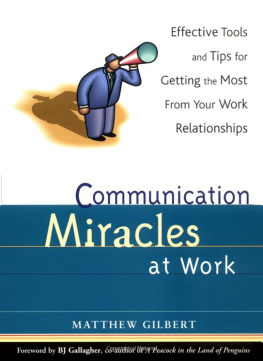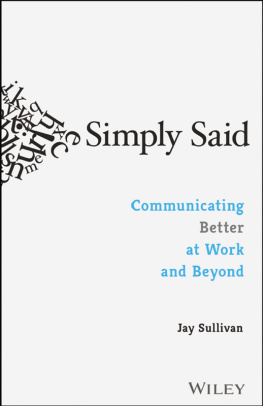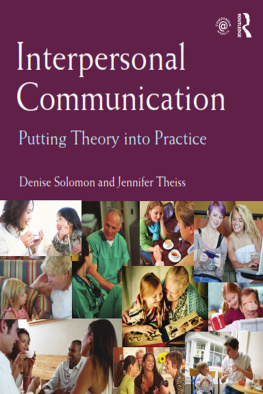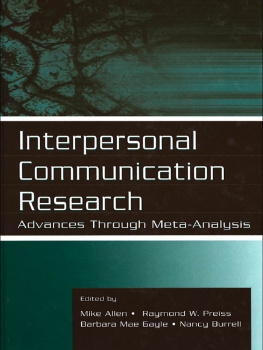Interpersonal Communication Skills in the Workplace
Second Edition
Interpersonal Communication Skills in the Workplace
Second Edition
Perry McIntosh
Richard Luecke
Jeffery H. Davis

Myers-Briggs Type Indicator and MBTI are registered trademarks of Consulting Psychologists Press, Inc.
Copyright 2008 American Management Association. All rights reserved.
This material may not be reproduced, stored in a retrieval system, or transmitted in whole or in part, in any form or by any means, electronic, mechanical, photocopying, recording, or otherwise, without the prior written permission of the publisher.
ISBN10: 0-7612-1475-5
ISBN13: 978-0-7612-1475-5
Printed in the United States of America.
10 9 8 7 6 5 4 3 2 1
About This Course
Effective communication is an important element of success for every organization, leader, manager, supervisor, and employee. Good communication skills are a prerequisite for advancement in most fields and are key to exercising influence both within and beyond the work group. This new edition of Interpersonal Communication Skills in the Workplace prepares readers to communicate effectively, both within their organizations and in whatever business or professional situations they encounter.
This edition retains the subject matter strengths of the previous version and augments them with content that reflects new understandings of interpersonal communications, new communication technologies, and new organizational practices that include wider spans of management control, greater employee empowerment, geographically dispersed work groups, and team-based activities. It also contains new material on persuasive communications, dialogue, and nominal group technique. New chapters on techniques for generating ideas and solutions and communicating in the multicultural workplace offer fresh perspectives on topics that have become increasingly important in todays workplace. Throughout the course, the authors provide assessments, exercises, and Think About It sections that offer students numerous opportunities for practice and feedback.
Any person can realize the benefits of improved communication skills. Interpersonal Communication Skills in the Workplace, Second Edition, provides the insight and expertise needed to achieve this goal.
Perry McIntosh has more than twenty-five years of experience in corporate office environments. Much of that experience was gained in the publishing industry, where she began as an entry-level copyeditor and worked her way up to senior managerial and directorship positions, and to leadership positions on cross-functional teams. She currently runs her own book production service. Ms. McIntosh has an AB degree from Smith College and a certificate from the Center for Creative Leadership.
Richard Luecke has been a freelance business writer since 1992. His books have been published by Oxford University Press, John Wiley & Sons, and Harvard Business School Press. He has also written articles published by Harvard Management Update and Consulting to Management. Most of his work, however, involves collaborations with business school faculty, management consultants, and corporate executives. His recent clients include Harvard Business School Publishing, Massachusetts Institute of Technology, Mercer Human Resources Consulting, Northeastern University, Babson College, and Organizational Dynamics, Inc. Mr. Luecke earned an MBA from the University of St. Thomas and a BA in History from Shimer College.
Jeffery H. Davis, author of the first edition of Interpersonal Communication Skills in the Workplace, is a Principal Leadership Development Consultant with the MITRE Corporation. Mr. Davis was the founder of Organization Renewal Associates, a management consulting and organizational training firm working primarily with hi-tech, medical, government, and non-profit institutions. His specialties include leadership development, coaching and teamwork skills, workplace communication, change management, process improvement, and meeting facilitation. Mr. Davis has written six self-study courses for the American Management Association. He holds an M.Ed. in Management from Cambridge College.
How to Take This Course
This course consists of text material for you to read and three types of activities (the pre- and post-test, in-text exercises, and end-of-chapter review questions) for you to complete. These activities are designed to reinforce the concepts introduced in the text portion of the course and to enable you to evaluate your progress.
PRE- AND POST-TESTS
Both a pre-test and post-test are included in this course. Take the pre-test before you study any of the course material to determine your existing knowledge of the subject matter. Submit one of the scannable answer forms enclosed with this course for grading. On return of the graded pre-test, complete the course material. Take the post-test after you have completed all the course material. By comparing results of the pre-test and the post-test, you can measure how effective the course has been for you.
To have your pre-test and post-test graded, please mail your answer forms to:
Educational Services
American Management Association
P.O. Box 133
Florida, NY 10921
All tests are reviewed thoroughly by our instructors and will be returned to you promptly.
THE TEXT
The most important component of this course is the text, where the concepts and methods are presented. Reading each chapter twice will increase the likelihood of your understanding the text fully.
We recommend that you work on this course in a systematic way. Reading the text and working through the exercises at a regular and steady pace will help ensure that you get the most out of this course and retain what you have learned.
In your first reading, concentrate on getting an overview of the chapter content. Read the learning objectives at the beginning of the chapter first. They will act as guidelines to the major topics of the chapter and identify the skills you should master as you study the text. As you read the chapter, pay attention to the headings and subheadings. Find the general theme of each section and see how that theme relates to others. Dont let yourself get bogged down with details during the first reading; simply concentrate on understanding and remembering the major themes.
In your second reading, look for the details that underlie the themes. Read the entire chapter carefully and methodically, underlining key points, working out the details of examples, and making marginal notes as you go. Complete the activities.
ACTIVITIES
Interspersed with the text of each chapter you will find a series of activities. These can take a variety of forms, including essays, short-answer quizzes, or charts and questionnaires. Completing the activities will enable you to try out new ideas, practice and improve new skills, and test your understanding of the course content.
THE REVIEW QUESTIONS
After reading a chapter and before going on to the next chapter, work through the Review Questions. Answering the questions and comparing your answers to those given will help you to grasp the major ideas of that chapter. If you perform these self-check exercises consistently, you will develop a framework in which to place material presented in later chapters.
Next page








